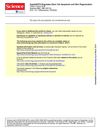Septin4 Promotes Cell Death in Human Colon Cancer Cells by Interacting with BAX
January 2020
in “
International Journal of Biological Sciences
”

TLDR Septin4 helps kill colon cancer cells by working with the protein BAX.
In the 2020 study, Septin4 was found to be a tumor suppressor protein with reduced expression in human colon cancer cells, correlating with poorer prognostic outcomes. The study, which included tissue specimens from 79 colon cancer patients, revealed that low Septin4 expression was significantly associated with higher cancer grades and worse overall survival. In vitro experiments demonstrated that overexpression of Septin4 increased apoptosis and ROS production in colon cancer cells, while its knockdown reduced apoptosis and promoted tumor growth in a mouse model. The interaction between Septin4 and the pro-apoptotic protein BAX was identified as a mechanism through which Septin4 promotes cell death, particularly under treatment with the chemotherapy drug doxorubicin (DOX). Additionally, the study touched on the role of Septin4_i2 (ARTS), which is involved in apoptosis and tumor suppression, and its decreased expression in various tumors. The findings suggest that Septin4 could be a potential target for colon cancer therapy, although further research is needed to explore its role in CRC invasion, metastasis, and resistance.
